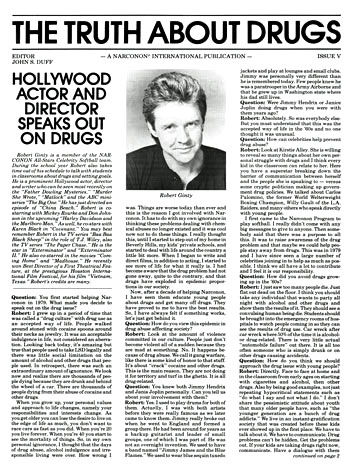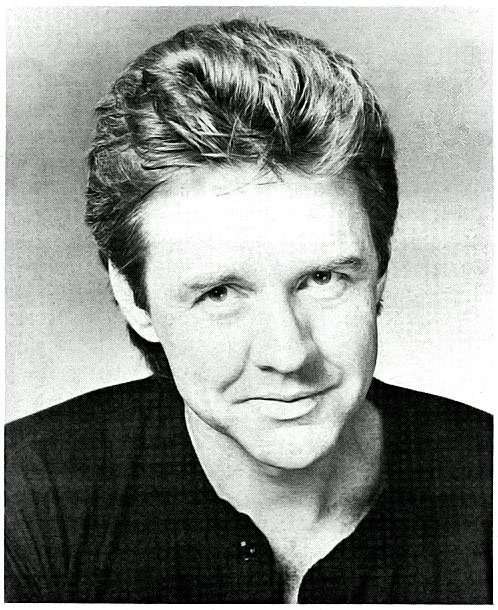Hollywood Actor and Director Speaks Out On Drugs

THE TRUTH ABOUT DRUGS
PRINTED AS A PUBLIC SERVICE BY NARCONON INTERNATIONAL
EDITOR JOHN S. DUFF
ISSUE V 1990
Robert Ginty is a member of the NARCONON All-Stars Celebrity Softball team. During the school year Robert also takes time out of his schedule to talk with students in classrooms about drugs and setting goals. He is a prominent Hollywood actor, director and writer who can be seen most recently on the ((Father Dowling Mysteries,” ((Murder She Wrote,” “Matlock” and the ABC miniseries “The Big One. ” He has just directed an episode of “China Beach.” Robert is costarring with Mickey Rourke and Don Johnson in the upcoming “Harley Davidson and the Marlboro Man.” As well, he co-stars with Karen Black in “Covenant.” You may best remember Robert in the TV series “Baa Baa Black Sheep” in the role of T.J. Wiley, also the TV series “The Paper Chase.” He is the star in “Exterminator” and ((Exterminator II.” He also co-starred in the movies “Coming Home” and ((Madhouse.” He recently won Best Director of a First Theatrical Feature, at the prestigious Houston International Film Festival, for his film ((Vietnam, Texas.” Robert’s credits are many.

Question: You first started helping Narconon in 1979. What made you decide to speak out on the drug issue?
Robert: I grew up in a period of time that was called a “drug culture” with drug use as an accepted way of life. People walked around stoned with cocaine spoons around their necks as jewelry. It was an acceptable indulgence in life, not considered an aberration. Looking back today, it’s amazing but true that people used to take LSD legally and there was little social limitation on the amount of alcohol and other drugs that people used. In retrospect, there was such an extraordinary amount of ignorance. We look now and realize there are thousands of people dying because they are drunk and behind the wheel of a car. There are thousands of people dying from their abuse of cocaine and other drugs.
When you grow up, your personal values and approach to life changes, namely your responsibilities and interests change. As you get older you can lose the desire to live on the edge of life as much, you don’t want to race cars as fast as you did. When you’re 20 you live forever. When you’re 40 you start to see the mortality of things. So, in my own personal ignorance, I thought that the days of drug abuse, alcohol indulgence and irresponsible living were over. How wrong I was. Things are worse today than ever and this is the reason I got involved with Narconon. It has to do with my own ignorance in thinking these problems dealing with chemical abuses no longer existed and it was cool now not to do these things. I really thought this, until I started to step out of my home in Beverly Hills, my kids’ private schools, and started to deal with life around the country a little bit more. When I began to write and direct films, in addition to acting, I started to see more of life for what it really is. I had become aware that the drug problem had not gone away, quite to the contrary, and that drugs have exploded in epidemic proportions in our society.
Now, after a decade of helping Narconon, I have seen them educate young people about drugs and get many off drugs. They have proved to me to have the best results. So, I have always felt if something works, let’s just get behind it.
Question: How do you view this epidemic in drug abuse affecting society?
Robert: Look at the amount of violence committed in our culture. People just don’t become violent all of a sudden because they are mad at something. No. It happens because of drug abuse. We call it gang warfare, like there is some kind of honor to that stuff. It’s about “crack” cocaine and other drugs. This is the main reason. They are not doing it for territory and turf in the ghetto. It is all drug-related.
Question: You knew both Jimmy Hendrix and Janis Joplin personally. Can you tell us about your involvement with them?
Robert: Yes. I used to play drums for both of them. Actually, I was with both artists before they were really famous as we later came to know them. Jimmy really broke out when he went to England and formed a group there. He had been around for years as a backup guitarist and leader of small groups, one of which I was part of. He was not an overnight invention. We used to have a band named “Jimmy James and the Blue Flames.” We used to wear blue sequin tuxedo jackets and play at lounges and small clubs. Jimmy was personally very different than he is remembered today. Few people knew he was a paratrooper in the Army Airborne and that he grew up in Washington state where his dad still lives.
Question: Were Jimmy Hendrix or Janice Joplin doing drugs when you were with them years ago?
Robert: Absolutely. So was everybody else. But you must understand that this was the accepted way of life in the ‘60s and no one thought it was unusual.
Question: How can celebrities help prevent drug abuse?
Robert: Look at Kirstie Alley. She is willing to reveal so many things about her own personal struggle with drugs and I think every kid in the classroom can relate to her. Here you have a superstar breaking down the barrier of communication between herself and the people she is speaking to - versus some cryptic politician making up government drug policies. We talked about Carlos Palomino, the former World Welterweight Boxing Champion, Willy Gault of the L.A. Raiders, and many others who speak directly with young people.
I first came to the Narconon Program to play softball. I really didn’t come with any big messages to give to anyone. Then somebody said that there was a purpose to all this. It was to raise awareness of the drug problem and that maybe we could help people stay away from drugs. This was in 1979 and I have since seen a large number of celebrities joining in to help as much as possible. I think we all have a lot to contribute and I feel it is our responsibility.
Question: How did you avoid drugs growing up in the ‘60s?
Robert: I just saw too many people die. Just flat out dead on the floor. I think you should take any individual that wants to party all night with alcohol and other drugs and show them the results of it. They should see a convulsing human being die. Students should be brought into the emergency rooms of hospitals to watch people coming in so they can see the results of drug use. Car wreck after car wreck where 50% of the time it is alcohol or drug-related. There is very little actual “automobile failure” out there. It is all too often someone who is simply drunk or on other drugs causing accidents.
Question: How do you think we should approach the drug issue with young people?
Robert: Directly. Face to face at home and in the classroom from early ages on starting with cigarettes and alcohol, then other drugs. Also by being good examples, not just repeating hypocritical statements such as “do what I say and not what I do.” I don’t share the pessimistic attitude about youth that many older people have, such as “the younger generation are a bunch of drug addicts.” We live in an instant-gratification society that was created before these kids ever showed up in the first place. We have to talk about it. We have to communicate. Drug problems can’t be hidden. Get the problems out. If your kids are taking drugs right now, communicate. Have a dialogue with them about it. Find out why we are a society using alcohol and other drugs and not really enjoying the many things life has to give us.
Question: You said that you’re not pessimistic about the drug problem. Do you have any advice to young people?
Robert: Let me quote something from Robert Kennedy; “Some people see things as they are and say why; I dream things that can be and say why not.” This has always stuck with me.
We as adults must earn the trust of young people. That is our responsibility, not theirs. We must start them on a road of positive living so we can all have the opportunity of obtaining our goals in life.
The Truth About Drugs Issue V
A Narconon International Publication
Editor John S. Duff
Hollywood Actor and Director Speaks Out On Drugs
Other Special Interviews:
Today, the Narconon drug education program has reach millions of kids around the world. For more of the Narconon history.